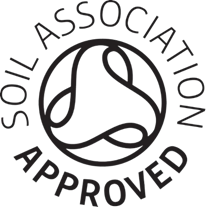- Soil Association
- Certification
- Farming
- What is organic certification?

What is organic certification?
What is organic farming certification?
If you want to sell products as organic, you must hold a legal certificate of registration from an approved organic certification body, like Soil Association Certification.
I haven’t yet met a farmer that regrets their decision to farm organically...it’s often a leap of faith, but once you’ve started farming organically the satisfaction is worth a lotSophie Alexander, Hemsworth Farm
Organic food and farming is defined by law and set out in EU regulations. Any product sold as organic in the UK must comply with a set of production and processing standards.
We help you to meet the requirements of organic conversion and certification, inspect your business to organic standards and provide you with an organic license to sell your products with the use of the Soil Association Organic Symbol. We certify all farm sizes from direct sales horticulture to livestock and largescale arable. We offer joint inspections with other audits and provide organic certification for on–farm processing and packing.
The following operations are subject to the certification process:
- On-farm production
- Processing involving food storage, packing and storage, including on-farm processing
- Animal feeds production
- Re-labelling of products at any stage of the distribution chain
- Organic products imported from countries outside the European Union, known as third countries
There’s a premium in the market place so financially, if you can make the rotation work, there is a real business case for organic farmingJoe Rolfe, RB Organics
Rather than relying on chemical inputs, organic farmers and growers adopt management practices that build and enhance natural soil fertility. This involves using organic matter, green manures and long-term crop rotations. It means controlling weeds, pests and diseases through mechanical weeding, variety choice and by encouraging natural predators.
Livestock play an important role on most organic farms, although stockless management is possible.
Our organic standards address all aspects of livestock management including:
- stocking and housing requirements,
- feed and veterinary medicines as well as
- transport and slaughter.
Organic farming provides a range of environmental benefits, such as improved natural soil health and fertility, increasing carbon storage in soil and more wildlife and biodiversity.
Organic farms have up to 50 percent more wildlife abundance on average.
-
Preparing your farm for organic conversion
Converting your farm for organic production is a commitment that requires careful planning. Find out more about the conversion process here.
Find out more
-
What is input certification?
Find out about approved and verified inputs, and how you can get certified.
Find out more
